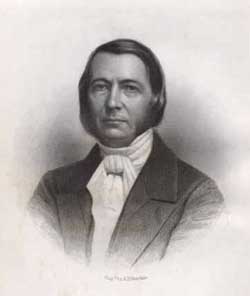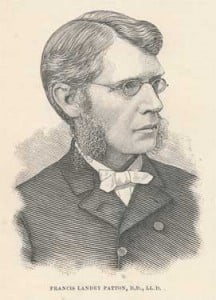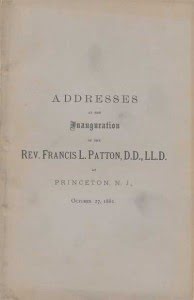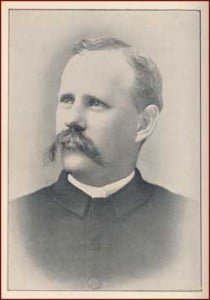Earliest Inklings of a Long Discussion
It was on this day, December 17th, in 1840, that James Henley Thornwell wrote of his intention to address an issue which would then be debated in the Presbyterian Church for the next twenty years.
Readers will please consider the following as an initial dipping of the toe in some very deep waters. Students of American Presbyterian history will (or should) know something of the famous “Board Debates” of the 19th-century. All others will no doubt be suitably bored to tears. 😉
The Board Debates began in earnest in 1841 and continued on until their culmination in the famous debate between Thornwell and Hodge on the floor of the General Assembly in 1860. By some accounts, the debate continued on for another few decades at least. These Debates were essentially a leftover or unaddressed issue that resulted from the 1837 split of the Presbyterian Church in the U.S.A. into Old School and New School factions. That split had occurred for a number of reasons, but the heart of the matter lay in the 1801 Plan of Union, whereby Congregationalists and Presbyterians worked in concert to plant churches throughout the rapidly expanding western territories. That association between the two denominations soured when the heterodox New Haven Theology began to spread first among Congregationalists and subsequently among Presbyterians.
To see the Board Debates sketched out, click here. For a thorough examination of the Board Debates, see Kenneth J. Foreman, Jr.’s doctoral dissertation, The Debate on the Administration of Missions Led by James Henley Thornwell in the Presbyterian Church, 1839-1861.
The following is an excerpt from Chapter 16 of The Life & Letters of James H. Thornwell (1875), by Benjamin M. Palmer, pertaining to the Board Debates. Note too Dr. Palmer’s aside concerning both Thornwell’s temper and his prevailing humility:—
 It has been stated, in a preceding chapter, that most of the discussions in which Dr. Thornwell was engaged, were a sort of remainder from the original controversy by which the Church was rent, in 1837-1838. The first that emerged into view was the discussion about Boards. During the period when the Church was brought under a species of vassalage to Congregationalism, the great National Societies, which usurped her functions, conducted their operations by the agency of Boards. The Church had become familiar with that mode of action; and when the effectual blow was struck for her emancipation, this was supposed to be fully accomplished, when these national organizations were disowned. The great principle upon which the argument turned, that the Church, in her organized form, must do her own work, was supposed to be satisfied, when Boards exactly analogous were established by the Church herself, as the agents by whom her will was to be carried out. It could not be long, however, before it was perceived that the above-named cardinal principle must be extended further: that a Board, consisting of many members, distributed over a large territory, to whom her evangelistic functions were remitted, did not satisfy the idea of the Church acting in her own capacity, and under the rules which the Constitution prescribed for her guidance. Dr. Thornwell was one of those who planted themselves firmly against their continuance in the Church. It is not the business of the biographer to discuss his views, but only to afford him the opportunity of presenting them. It may be remarked, however, that he was not opposed to combined or united action on the part of the Church, but only insisted that the central agency should be simply executive: the mere instrument by which the Assembly acts, and not an agent standing in the place of the Assembly, and acting for it. The first occasion on which he publicly developed his views was at the meeting of the Synod of South Carolina and Georgia; where a stiff debate was held upon the principles involved, and in which the Rev. Thomas Smyth, D. D., of Charleston, S. C, was his chief antagonist. An incident is related of this debate, so characteristic of the man, that it deserves to be recorded. In the heat of the discussion, he suffered himself to be borne beyond the bounds of strict propriety. The old spirit of invective and sarcasm, which later years so perfectly subdued, manifested itself in expressions a little too scornful of his opponent, and the impression was not pleasant upon the house. It so happened that his speech closed exactly at the hour of recess at noon, and there was no opportunity for rejoinder. Immediately upon re-assembling, he arose and apologised in handsome terms for the discourtesy into which he had been betrayed, and declared his profound esteem for the learning, ability, and piety of his adversary. It was done so spontaneously, and with such evident sincerity, that criticism was completely disarmed; and there was a universal feeling of admiration for the magnanimity and courage which could so fully redeem a fault.
It has been stated, in a preceding chapter, that most of the discussions in which Dr. Thornwell was engaged, were a sort of remainder from the original controversy by which the Church was rent, in 1837-1838. The first that emerged into view was the discussion about Boards. During the period when the Church was brought under a species of vassalage to Congregationalism, the great National Societies, which usurped her functions, conducted their operations by the agency of Boards. The Church had become familiar with that mode of action; and when the effectual blow was struck for her emancipation, this was supposed to be fully accomplished, when these national organizations were disowned. The great principle upon which the argument turned, that the Church, in her organized form, must do her own work, was supposed to be satisfied, when Boards exactly analogous were established by the Church herself, as the agents by whom her will was to be carried out. It could not be long, however, before it was perceived that the above-named cardinal principle must be extended further: that a Board, consisting of many members, distributed over a large territory, to whom her evangelistic functions were remitted, did not satisfy the idea of the Church acting in her own capacity, and under the rules which the Constitution prescribed for her guidance. Dr. Thornwell was one of those who planted themselves firmly against their continuance in the Church. It is not the business of the biographer to discuss his views, but only to afford him the opportunity of presenting them. It may be remarked, however, that he was not opposed to combined or united action on the part of the Church, but only insisted that the central agency should be simply executive: the mere instrument by which the Assembly acts, and not an agent standing in the place of the Assembly, and acting for it. The first occasion on which he publicly developed his views was at the meeting of the Synod of South Carolina and Georgia; where a stiff debate was held upon the principles involved, and in which the Rev. Thomas Smyth, D. D., of Charleston, S. C, was his chief antagonist. An incident is related of this debate, so characteristic of the man, that it deserves to be recorded. In the heat of the discussion, he suffered himself to be borne beyond the bounds of strict propriety. The old spirit of invective and sarcasm, which later years so perfectly subdued, manifested itself in expressions a little too scornful of his opponent, and the impression was not pleasant upon the house. It so happened that his speech closed exactly at the hour of recess at noon, and there was no opportunity for rejoinder. Immediately upon re-assembling, he arose and apologised in handsome terms for the discourtesy into which he had been betrayed, and declared his profound esteem for the learning, ability, and piety of his adversary. It was done so spontaneously, and with such evident sincerity, that criticism was completely disarmed; and there was a universal feeling of admiration for the magnanimity and courage which could so fully redeem a fault.
Words to Live By:
Thornwell’s views derived from a core principle—the idea that God is sovereign over His Church. His sovereignty is manifest in doctrine, in worship, and in polity or governance. In each of these three aspects of the Church, God has, in the Scriptures, revealed His sovereign will for the Church. We have no right to invent doctrine, we have no right to invent ways to worship Him, and we have no right to introduce structures and practices for the operation of His Church, other than what is revealed in His Word. That in sum is, I think, a fairly accurate summary of the heart of Thornwell’s system of thought. Others may disagree with him, but you have to admire Thornwell for never having backed away from his convictions.
Never mock a man for his studied convictions. If someone has put a lot of time, study and thought into carefully weighing a matter, then they at least deserve your respect, even if you disagree with them. If you must mock anyone at all, reserve your mockery for those who give little thought to a matter yet come down hard on one side or the other of an issue. Rash conclusions deserve to be belittled. Careful students, on the other hand, are in short supply and should be valued, wherever we find them.




